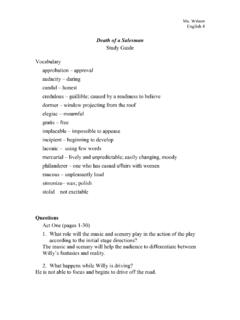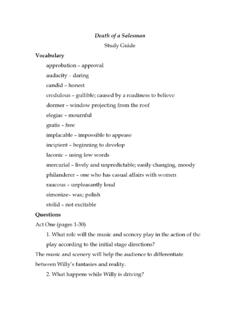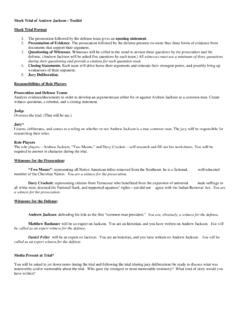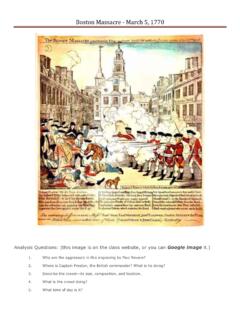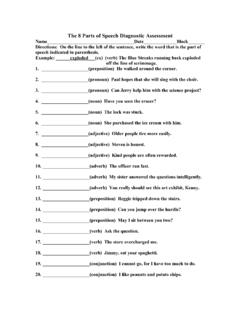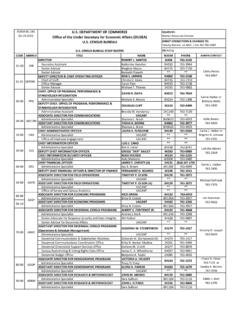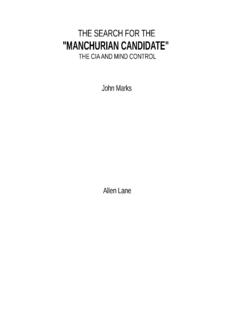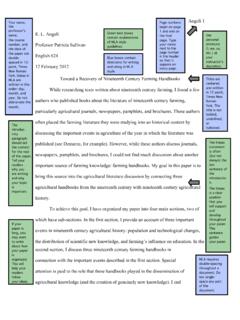Transcription of John G. Burnett, “The Cherokee Removal Through the Eyes of ...
1 john G. Burnett, The Cherokee Removal Through the Eyes of a Private Soldier . December 11, 1890. Annotation By President Andrew Jackson's election in 1828, the only large concentrations of Indian tribes remaining on the east coast were located in the South. The Cherokee had adopted the settled way of life of the surrounding and encroaching white society. They were consequently known, along with the Creek, Seminole, Chickasaw, and Choctaw, as one of the Five Civilized Tribes.. Civilization, however, was not enough, and the Jackson administration forced most of these tribes west during the first half of the 1830s, clearing southern territory for the use of whites. Chief john Ross was the principal chief of the Cherokee in Georgia; in this 1836 letter addressed to the Senate and House of Representatives, Ross protested as fraudulent the Treaty of New Etocha that forced the Cherokee out of Georgia.
2 In 1838, federal troops forcibly displaced the last of the Cherokee from their homes; their trip to Indian Territory (Oklahoma) is known as the Trail of Tears.. In May 1838, federal militias started to round up Cherokees and move them into stockades (concentration camps) in several southern states. They were then forced to march 1,000 miles westward. 4,000 to 6,000 Cherokees died as a result of the Removal . The journey became known as the Trail of Tears or the Trail where They Cried. Fifty years later, in 1890, Private john Burnett, who served in the mounted infantry, told his children his memories of the Trail of Tears, which he described as the execution of the most brutal order in the History of American Warfare.. This is my birthday, December 11, 1890.
3 I am eighty years old today. I was born at Kings Iron Works in sullivan County, Tennessee, December the 11, 1810. I grew into manhood fishing in Beaver Creek and roaming Through the forest hunting the deer and the wild boar and the timber wolf. Often spending weeks at a time in the solitary wilderness with no companions but my rifle, hunting knife, and a small hatchet that I carried in my belt in all of my wilderness wanderings. On these long hunting trips I met and became acquainted with many of the Cherokee Indians, . The Removal of Cherokee Indians from their life long homes in the year of 1838 found me a young man in the prime of life and a Private soldier in the American Army. Being acquainted with many of the Indians and able to fluently speak their language, I was sent as interpreter into the Smoky Mountain Country in May, 1838, and witnessed the execution of the most brutal order in the History of American Warfare.
4 I saw the helpless Cherokees arrested and dragged from their homes, and driven at the bayonet point into the stockades. And in the chill of a drizzling rain on an October morning I saw them loaded like cattle or sheep into six hundred and forty- five wagons and started toward the west. One can never forget the sadness of that morning. Chief john Ross led in prayer and when the bugle sounded and the wagons started rolling many of the children rose to their feet and waved their little hands goodbye to their mountain homes, knowing they were leaving them forever. Many of these helpless people did not have blankets and many of them had been driven from home barefooted. On the morning of November the 17th we encountered a terrific sleet and snowstorm with freezing temperatures and from that day until we reached the end of the fateful journey on March the 26th, 1839, the sufferings of the Cherokees were awful.
5 The trail was a trail of death. They had to sleep in the wagons and on the ground without fire. And I have known as many as twenty-two of them to die in one night of pneumonia due to ill treatment, cold, and exposure. Among this number was the beautiful Christian wife of Chief john Ross [Quatie Ross]. This noble hearted woman died giving her only blanket for the protection of a sick child. She rode Through a blinding sleet and snow storm, developed pneumonia and died in the still hours of a bleak winter night, with her head resting on Lieutenant Greggs saddle blanket. I made the long journey to the west with the Cherokees and did all that a Private soldier could do to alleviate their sufferings. When on guard duty at night I have many times walked my beat in my blouse in order that some sick child might have the warmth of my overcoat.
6 I was on guard duty the night Mrs. Ross and at daylight was detailed by Captain McClellan to assist in the burial like the other unfortunates who died on the way. Her unconfined body was buried in a shallow grave by the roadside far from her native home, and the sorrowing Cavalcade moved on . The long painful journey to the west ended March 26th, 1839, with 4,000 silent graves reaching from the foothills of the Smoky Mountains to what is known as Indian territory in the West (Oklahoma). And covetousness (greed) on the part of the white race was the cause of all that the Cherokees had to suffer. In the year 1828, a little Indian boy living on Ward creek had sold a gold nugget to a white trader, and that nugget sealed the doom of the Cherokees. In a short time the country was overrun with armed brigands (bandits) claiming to be government agents, who paid no attention to the rights of the Indians who were the legal possessors of the country.
7 Crimes were committed that were a disgrace to civilization. Men were shot in cold blood, lands were confiscated. Homes were burned and the inhabitants driven out by the gold- hungry brigands. Chief Junaluska was personally acquainted with President Andrew Jackson. Junaluska had taken 500 Cherokee scouts and helped Jackson to win the battle of the Horse Shoe (New Orleans), leaving 33 of them dead on the field. And in that battle Junaluska had drove his Tomahawk Through the skull of a Creek warrior, when the Creek had Jackson at his mercy. Chief john Ross sent Junaluska as an envoy to plead with President Jackson for protection for his people, but Jackson's manner was cold and indifferent toward the the [person] who had saved his life. He met Junaluska, heard his plea but curtly said, "Sir, your audience is ended.
8 There is nothing I can do for you." The doom of the Cherokee was sealed. Washington, , had decreed that they must be driven West and their lands given to the white man, and in May 1838, an army of 4000 regulars, and 3000 volunteer soldiers under command of General Winfield Scott, marched into the Indian country and wrote the blackest chapter on the pages of American history. Men working in the fields were arrested and driven to the stockades. Women were dragged from their homes by soldiers whose language they could not understand. Children were often separated from their parents and driven into the stockades with the sky for a blanket and the earth for a pillow. And often the old and infirm (sickly) were prodded with bayonets to hasten them to the stockades.
9 In one home death had come during the night. A little sad-faced child had died and was lying on a bear skin couch and some women were preparing the little body for burial. All were arrested and driven out leaving the child in the cabin. I don't know who buried the body. In another home was a frail Mother, apparently a widow and three small children, one just a baby. When told that she must go, the Mother gathered the children at her feet, prayed a humble prayer in her native tongue, patted the old family dog on the head, told the faithful creature goodbye, with a baby strapped on her back and leading a child with each hand started on her exile. But the task was too great for that frail Mother. A stroke of heart failure relieved her sufferings. She sunk and died with her baby on her back, and her other two children clinging to her hands.
10 Chief Junaluska who had saved President Jackson's life at the battle of Horse Shoe witnessed this scene, the tears gushing down his cheeks and lifting his cap he turned his face toward the heavens and said, "Oh my God, if I had known at the battle of the Horse Shoe what I know now, American history would have been differently written.". At this time, 1890, we are too near the Removal of the Cherokees for our young people to fully understand the enormity of the crime that was committed against a helpless race. Truth is, the facts are being concealed from the young people of today. School children of today do not know that we are living on lands that were taken from a helpless race at the bayonet point to satisfy the white man's greed. murder is murder whether committed by the villain skulking in the dark or by uniformed men stepping to the strains of martial music (obeying orders).
